Key takeaways:
- First experiences in outdoor catering teach resilience and the value of connection through food.
- Weather unpredictability and logistics are significant challenges; having backup plans is essential for success.
- Engaging with clients and valuing feedback enhances service, fosters trust, and informs future improvements.
- Flexibility, thorough preparation, and teamwork are critical lessons learned from catering experiences to handle unexpected situations effectively.
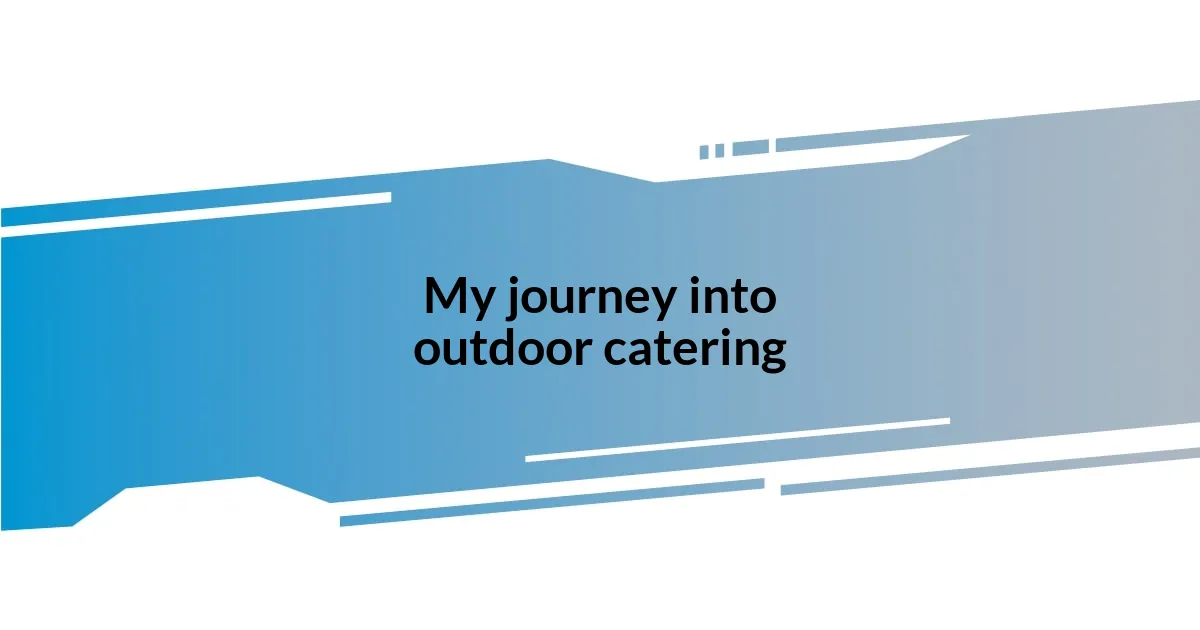
My journey into outdoor catering
I vividly remember my first experience with outdoor catering. It wasn’t glamorous; I was knee-deep in mud at a rainy outdoor wedding, trying to keep everything from sliding off the tables. As I struggled to set up, I found myself questioning my decision—was I cut out for this?
As the day unfolded, however, I stumbled into a rhythm. The laughter of guests and the delicious aroma of grilled foods wafting through the air made me realize why I was there. It was a lesson in resilience, but the joy of witnessing people bond over food was a reward in itself. Have you ever felt the exhilaration of overcoming an unexpected challenge?
The more I immersed myself in this field, the more I cherished these moments. With each event, I discovered not just the food, but also the connections it creates. Each hurdle I faced only deepened my commitment to this passion and taught me that outdoor catering is as much about the experience as it is about the cuisine.
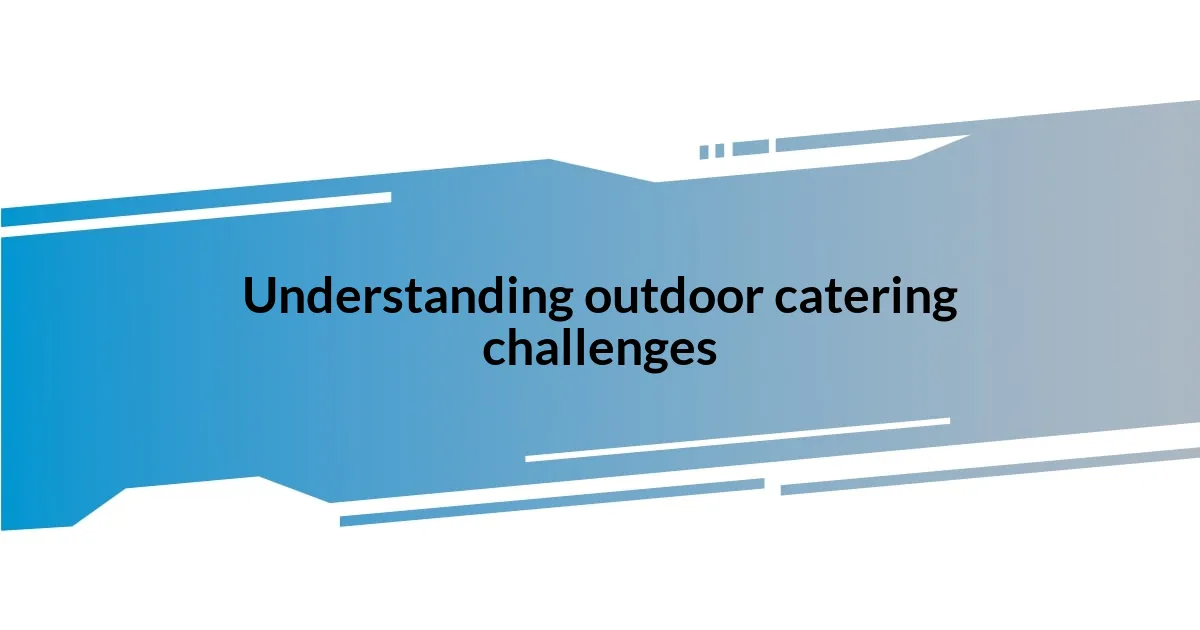
Understanding outdoor catering challenges
Understanding the challenges of outdoor catering is crucial for anyone diving into this unpredictable landscape. One specific challenge I faced was the sudden shift in weather. I remember a picnic-style event where we had to contend with gusty winds that nearly sent our meticulously arranged platters flying. Managing not just the food, but the environment, can turn anyone’s nerves into knots. It’s a balancing act that requires quick thinking and adaptability.
To give you a clearer picture, here are some of the most common outdoor catering challenges I’ve encountered:
– Weather fluctuations: Rain, wind, and temperature changes can affect food quality and guest comfort.
– Logistics: Setting up in a remote location presents unique issues with transportation and accessibility.
– Permitting: Sometimes, you need special permits for outdoor events, which can be baffling to navigate.
– Sanitation: Ensuring food safety becomes a juggling act when facilities are limited.
– Power sources: Finding reliable electricity for cooking and serving can be tricky, especially in parks or forests.
Each of these challenges has taught me valuable lessons in preparation and flexibility. I remember one event where meticulous planning fell through due to an unexpected downpour. In the end, the quick adjustments we made turned a potentially disastrous situation into one of the most memorable evenings for the guests. It’s moments like these that shape your approach in outdoor catering.
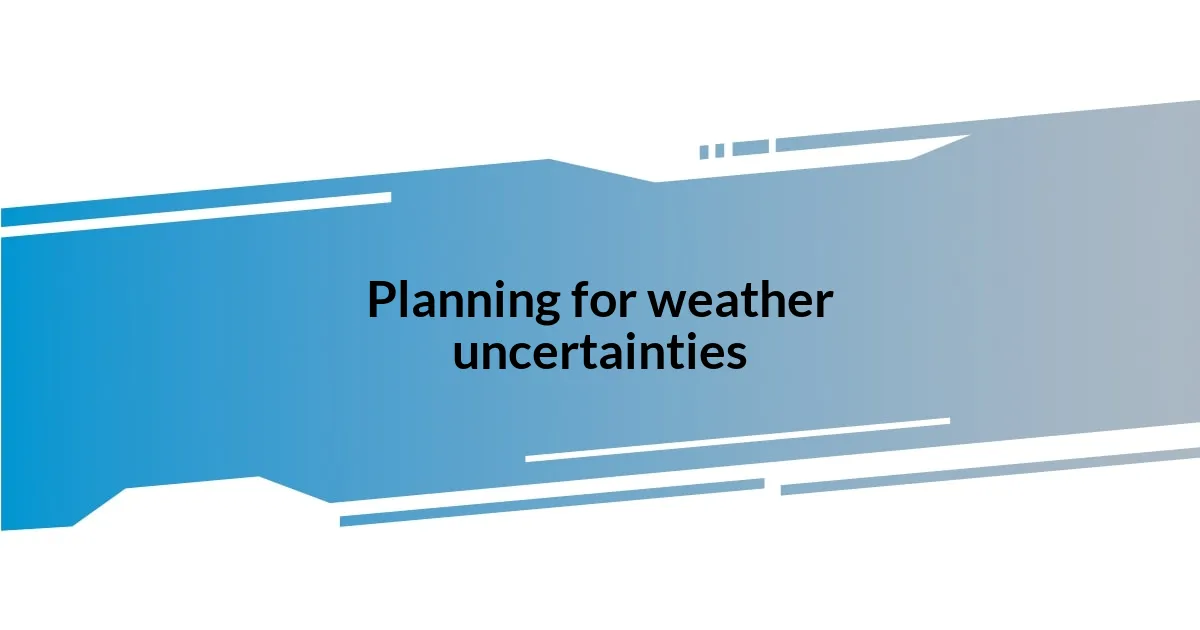
Planning for weather uncertainties
Planning for weather uncertainties is a vital part of outdoor catering that can’t be overlooked. When I think back to my experiences, one incident stands out. I was catering for a corporate picnic, and the forecast was clear. But wouldn’t you know it, half an hour before the event, dark clouds rolled in, and raindrops began to fall. I learned that even the best plans can go awry, and being adaptable not only saves the day but also ensures the guests have a great time, rain or shine.
I’ve learned to always have a backup plan, whether it’s renting tents or bringing extra supplies. During a family reunion barbecue, we had the foresight to set up a large tent, which turned out to be a lifesaver when the skies opened up unexpectedly. Guests huddled under the shelter, sharing stories and laughter, transforming a potentially damp disaster into a cozy gathering. It reminds me that with some foresight and preparation, we can control what’s within our reach.
One essential tip is to check the weather frequently leading up to the event but also to hold space for spontaneity. I remember planning an outdoor anniversary dinner, only to see a storm warning pop up on the day itself. Instead of panicking, we adjusted our setup and moved the event indoors at the last minute, creating an intimate atmosphere that guests loved even more. Embracing these unexpected changes has become part of the adventure for me.
| Weather Condition | Backup Plan |
|---|---|
| Rain | Have tents or awnings ready; ensure food is covered. |
| Wind | Use weighted tablecloths and secure all outdoor items. |
| Heat | Provide shade structures and ice-cold refreshments. |
| Cold | Offer heating lamps or blankets to keep guests warm. |
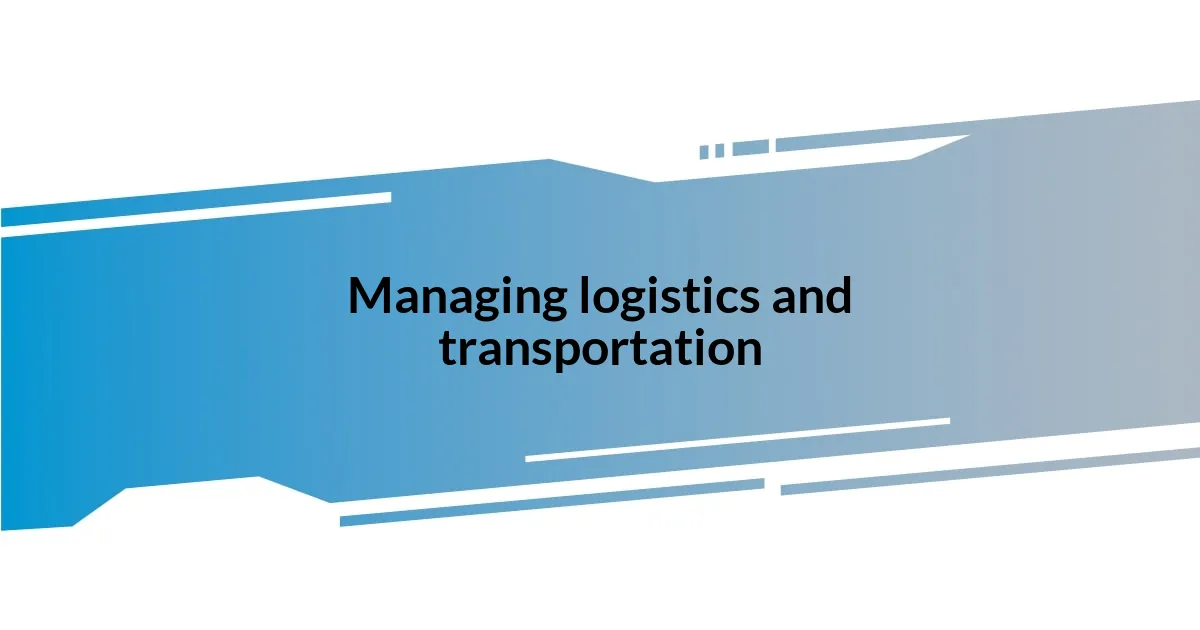
Managing logistics and transportation
When it comes to managing logistics and transportation for outdoor catering, I’ve encountered my fair share of hurdles. One incident that resonates with me was when I had to transport an elaborate buffet setup across a winding forest road. The nerves I felt while envisioning a toppled cake in the back of the van were palpable! It taught me that securing food and equipment properly is just as crucial as the menu itself. Have you ever had that heart-stopping moment where you hope everything arrives intact? Planning for these scenarios can make all the difference.
I’ve found that pre-event site visits are invaluable. I remember showing up to a beautiful lakeside venue only to realize there was no vehicle access right to the setup area. Suddenly, our convenient transport plan turned into a logistical puzzle. We had to carry everything, including heavy coolers and stacks of plates, by hand over a rocky path! That experience drove home the point that knowing your venue is essential. It’s discouraging to face these challenges, but they force you to be creative. How can I make this easier next time?
Another important lesson involves timing. I’ve learned that packing the truck the night before and mapping out my route can save precious minutes on event day. There was one instance when a last-minute traffic jam almost made me late. The whole time, I was thinking, “What if I don’t make it in time?” I’ve since incorporated buffer time into my schedule, ensuring that no matter how unpredictable transportation may be, I have that cushion for peace of mind. Balancing careful planning with flexibility is the key to handling logistics like a pro!
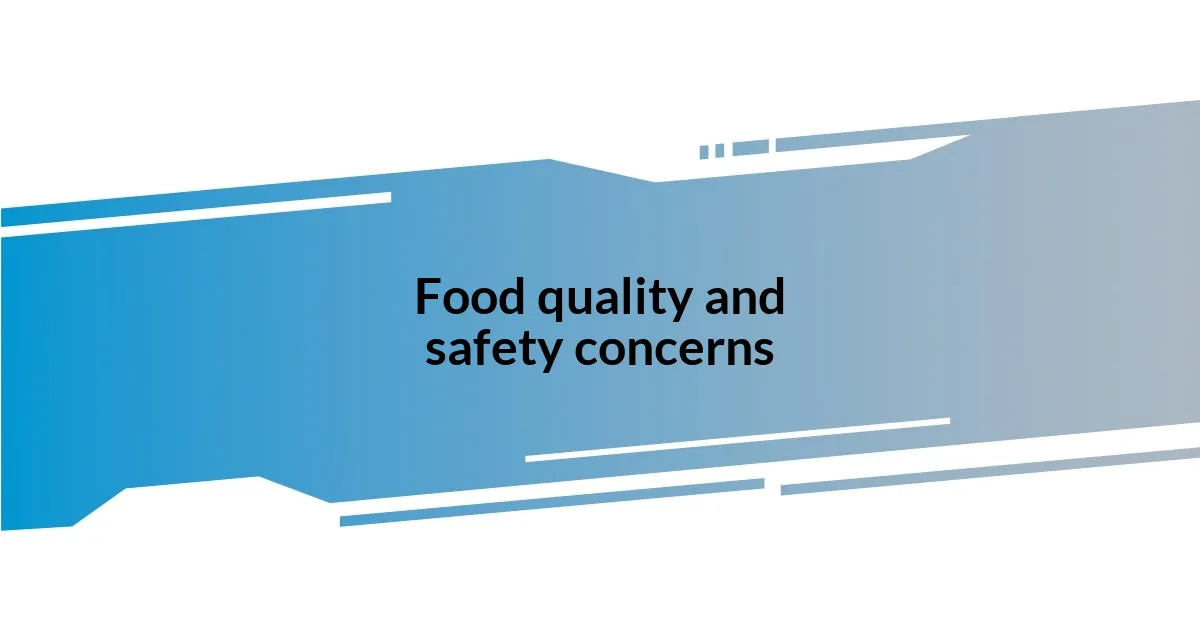
Food quality and safety concerns
One of the greatest concerns I’ve faced with outdoor catering revolves around food quality and safety. I vividly remember a summer wedding where, despite the beautiful setting and happy atmosphere, I was haunted by the thought of food spoilage. Without proper refrigeration, the temperature can rise quickly, making it imperative to monitor the food closely. Have you ever wondered what could happen if a dish isn’t served safely? It’s a worry that keeps me up at night, but being proactive has made all the difference.
One incident stands out: For a large picnic, I mistakenly underestimated how long it would take the food to warm up. While the guests were enjoying games, I realized my salads were getting warm under the sun. A quick dash to the coolers saved them, but it further cemented my belief in the importance of insulated containers. I often reflect on how easy it is to overlook these small details when everything else feels chaotic. Safety should never be sacrificed for convenience, and I’ve learned the hard way to double-check storage and serving temperatures.
It’s also crucial to educate staff on food safety practices. During one event, a well-meaning helper accidentally left a platter of shrimp out for too long. Infuriating as it was in the moment, it became a valuable lesson for everyone involved. I took that experience to heart, reminding my team that understanding food safety is just as vital as preparing delicious meals. By encouraging open conversations about these concerns, we create a culture of awareness that ultimately protects our guests. How else could we ensure everyone has a great time while staying safe? Keeping this dialogue alive is paramount in the outdoor catering industry.

Engaging with clients and feedback
Engaging with clients is an essential aspect of outdoor catering that I genuinely enjoy. I recall a situation where a client was nervous about the menu choices. We sat down together, discussing their vision and preferences, which helped build trust and understanding. Isn’t it rewarding when clients see their ideas come to life? It’s moments like these that reinforce my belief in the value of open communication.
Feedback plays a crucial role in refining our services. After a recent corporate event, I reached out to the organizers for their thoughts. They shared that while the food was fantastic, they wished we had more vegetarian options. I listened closely, noting how their feedback would shape future menus. How often do we miss out on improvements simply because we don’t ask? This proactive approach to gathering insights has led to a stronger rapport with clients.
I’ve also learned that addressing concerns promptly can turn a potential issue into a positive experience. At one outdoor wedding, a torrential downpour hit just as we were setting up. The couple was understandably anxious. I reassured them that we had a backup plan, and we adapted swiftly to move everything under a tent. Their gratitude afterwards reminded me that resilience and responsiveness can transform challenges into cherished memories. How do you feel when you know you’ve gone the extra mile for someone? It’s those moments that truly define our relationships with clients.
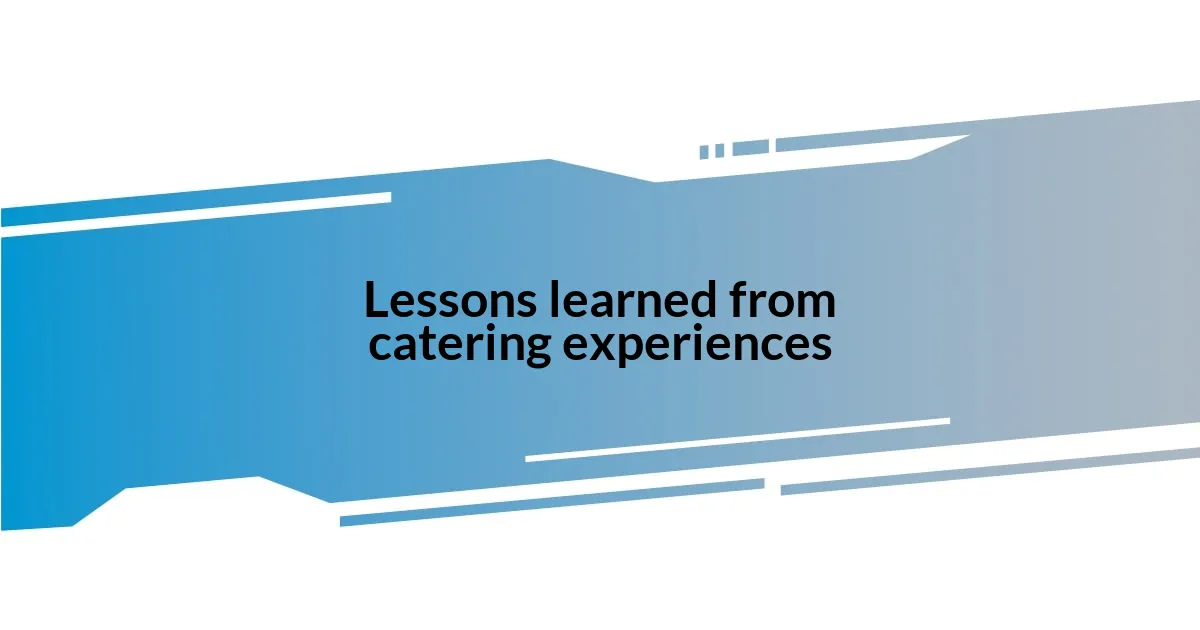
Lessons learned from catering experiences
I’ve discovered that flexibility is a key lesson in outdoor catering. I recall an event where the weather took an unexpected turn, and the planned buffet setup had to be altered last minute. The tension in the air was palpable as we scrambled to adapt. I quickly gathered my team to create a comfortable indoor experience instead. Watching the guests transition from uncertainty to enjoyment reminded me that adaptability can turn potential disasters into memorable moments. Have you ever found that being flexible can lead to surprising opportunities?
Another important lesson I’ve learned is the value of thorough preparation. During a particularly demanding event, I overlooked ensuring we had enough serving utensils. As the line grew longer, I noticed guests awkwardly trying to navigate their plates. Feeling the pressure, I managed to borrow some from a neighboring vendor, but it taught me that no detail is too small to overlook. The chaos of service can easily distract us, but preparation ensures that we aren’t scrambling when it counts the most. How often do we take for granted the importance of being prepared?
Lastly, teamwork is vital in the catering business. One time, our setup crew was running late, and my heart raced at the thought of missing our timeline. Thankfully, I had fostered a good relationship with other vendors. They jumped in, helping us set up in record time. This experience reminded me that building relationships can create a safety net during high-pressure moments. Isn’t it inspiring how a community can rally together? Emphasizing camaraderie with your team transforms stressful situations into smooth operations.